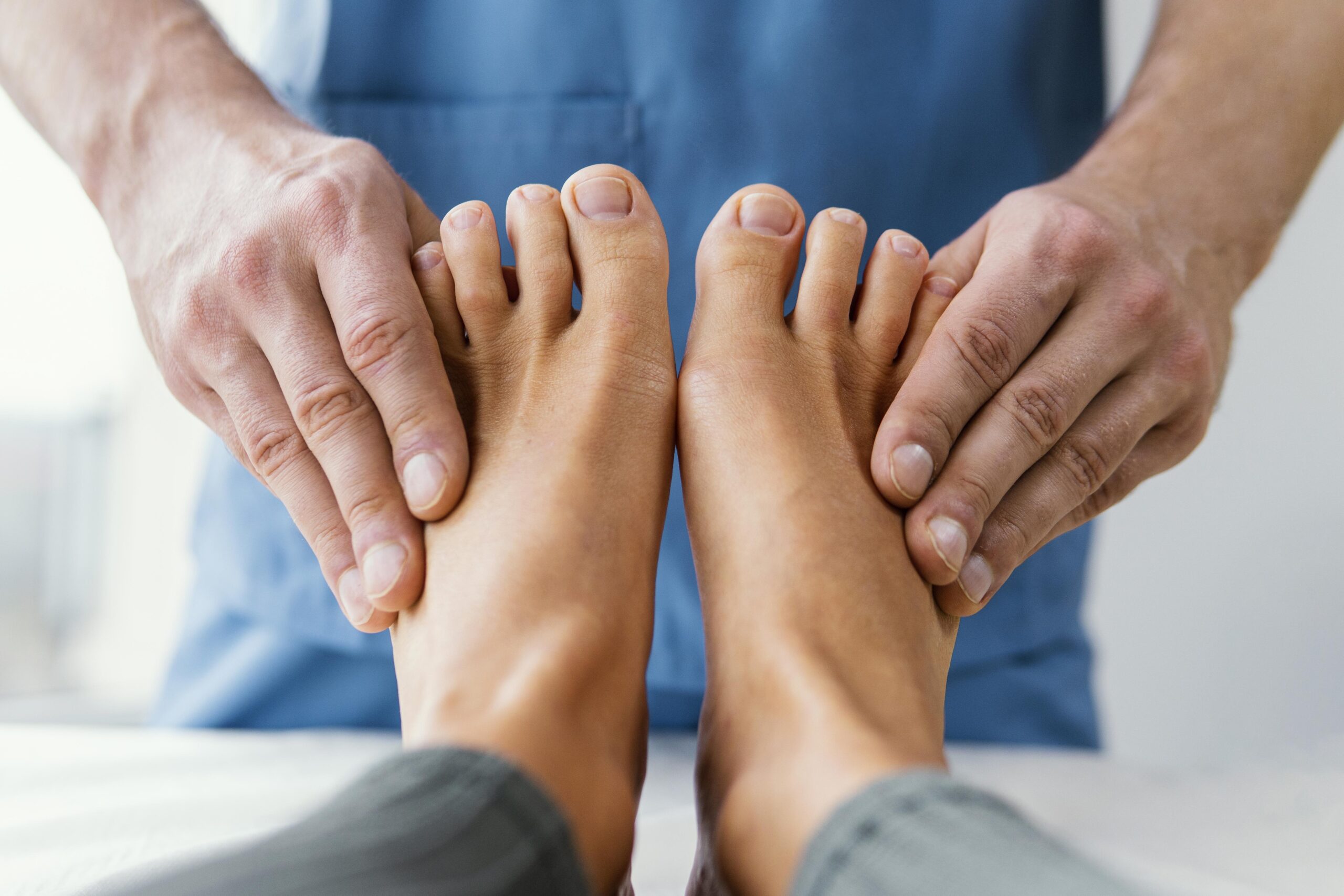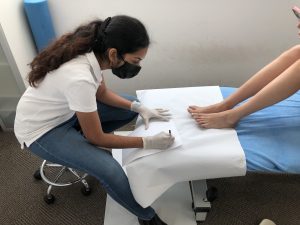
How often do you think about your feet? If you’re like most people, probably not much unless they start hurting. Yet, our feet are crucial for more than just walking. They affect our overall health in ways we might not expect. In this article, we’ll look closely at why foot health is so important. We’ll see how it connects to our general well-being.
The Critical Role of Feet in Overall Health
Support and Mobility
Feet are the base of almost everything we do. Whether we’re walking, running, or just standing, our feet hold us up. They support our body’s weight and help us move around. When our feet hurt, it can throw off our whole body. Have you noticed how a small foot pain can change the way you walk? This can lead to more issues with knees, hips, and even the back.
Complex Structures
Each foot has 26 bones, 33 joints, and over 100 muscles, tendons, and ligaments. This complexity lets us balance and walk on different surfaces. When our feet are healthy, they adjust as we move, keeping us stable. But if there’s a problem, it can make us clumsy or unsteady. This is especially true for older adults. How stable do you feel on your feet?
Sensing and Responding
Our feet are full of nerve endings that help us sense our environment. They tell us if the ground is hot, cold, or uneven. Healthy feet help us adjust our steps quickly and keep our balance. This keeps us safe from falls. Do you ever think about how much information your feet send to your brain?
Connection Between Foot Health and Systemic Conditions
Diabetes and Feet
If you have diabetes, foot health is critical. Diabetes can cause nerve damage known as peripheral neuropathy, making it hard to feel cuts or sores on your feet. These injuries can worsen quickly, leading to serious infections. Regular foot checks can catch these problems early. How often do you check your feet? Daily checks can make a big difference. It’s simple: look for any cuts, blisters, or swelling. Early detection can prevent severe complications.
Impact on Arthritis
Arthritis affects millions worldwide, often impacting the joints of the feet. Painful joints can make walking and standing uncomfortable or even unbearable. Supportive shoes and custom orthotics can help ease this pain by distributing your body weight more evenly, which reduces stress on your joints. Have you tried special shoes or inserts? They can significantly improve your comfort and mobility. Even simple changes in footwear can make daily activities less painful.
Link to Heart Health
Sometimes, foot problems signal bigger issues, like heart disease. Poor circulation in the feet can be a sign of peripheral arterial disease (PAD). PAD is linked to blocked arteries in the legs and can cause pain, making walking difficult. Keeping an eye on foot health can give early clues to heart problems. Do your feet ever feel unusually cold or numb? If so, it might be worth discussing with your doctor. Early intervention can prevent more serious health issues.
Impact of Foot Health on Quality of Life
Mobility and Independence
Did you know that the health of your feet can directly affect your daily life? A study in Riyadh found that people with foot problems often experience a drop in their quality of life. This is mainly because pain and discomfort limit their ability to move freely. Without this freedom, everyday tasks can become challenging and exhausting. When you can’t walk comfortably, your world can feel a lot smaller. This lack of mobility can lead to more than just physical limitations; it can impact your independence. Think about it: if you’re relying on others to help you get around, how does that make you feel?
Mental Health
It’s not just about physical pain. Chronic foot issues can lead to mental health struggles. Constant pain can wear you down, making you feel hopeless and frustrated. Have you ever noticed how a bad day for your feet can mean a bad day for your mood? This connection is significant because it can lead to a cycle of pain and emotional distress. People with foot pain often withdraw from social activities. They skip workouts and stay home more. This isolation can increase feelings of depression and anxiety.
Weight Management
Here’s another important aspect: weight management. When your feet hurt, exercising is the last thing you feel like doing. This can lead to weight gain, which adds even more pressure on your feet. It’s a vicious cycle, isn’t it? On the flip side, losing weight can ease foot pain. Less weight means less stress on your feet with every step you take. Isn’t it incredible how interconnected our body systems are?
Strategies for Maintaining Foot Health
Regular Foot Care
Let’s talk about keeping those feet in top shape. Regular foot care is crucial, especially if you have diabetes. Checking your feet daily for cuts, swelling, or nail problems can prevent serious issues. It’s like giving your feet a quick daily check-up. How long does it take? Just a few minutes! Moisturizing your feet can prevent dry skin and cracks. It’s best to avoid lotions between the toes, though. Those areas are prone to fungal infections if they get too moist. And when trimming your nails, always cut straight across to avoid ingrown toenails. Simple right?
Appropriate Footwear
Choosing the right shoes is a big deal for foot health. Shoes should fit well and offer good support. They shouldn’t squeeze or rub your feet. Do your shoes give you enough cushioning? Are they the right size? These are important questions to ask. For those with specific foot conditions, like high arches or flat feet, tailored footwear and inserts can make a huge difference. Have you ever tried orthotic inserts? They can help align your feet and reduce pain.
Professional Care and Check-ups
Seeing a foot specialist, like a podiatrist, can do wonders. They can catch problems early, offer treatments, and provide expert care advice. Regular visits to a podiatrist can keep you on your feet and pain-free. How often should you see a podiatrist? At least once a year, or more if you have ongoing issues.
Taking care of your feet is taking care of your overall well-being. It’s all connected—your mobility, your independence, and even your mood. With good foot health, you’re not just stepping pain-free. You’re stepping towards a happier, healthier life.
Isn’t it worth investing a little time each day to take care of your feet? After all, they carry you through life. Let’s step up to better health, starting with our feet. What’s your first step going to be?
References
Where do you stand?: an exploration of perspectives toward feet, foot health, and footwear using innovative digital methods
https://www.ncbi.nlm.nih.gov/pmc/articles/PMC10141949/
Foot health and quality of life among adults in Riyadh, Saudi Arabia: a cross-sectional study
https://www.ncbi.nlm.nih.gov/pmc/articles/PMC10007839/
Impact of quality of life related to foot problems: a case–control study
https://www.ncbi.nlm.nih.gov/pmc/articles/PMC8282620/
Evaluation of foot health related quality of life in individuals with foot problems by gender: a cross-sectional comparative analysis study
https://www.ncbi.nlm.nih.gov/pmc/articles/PMC6196950/




